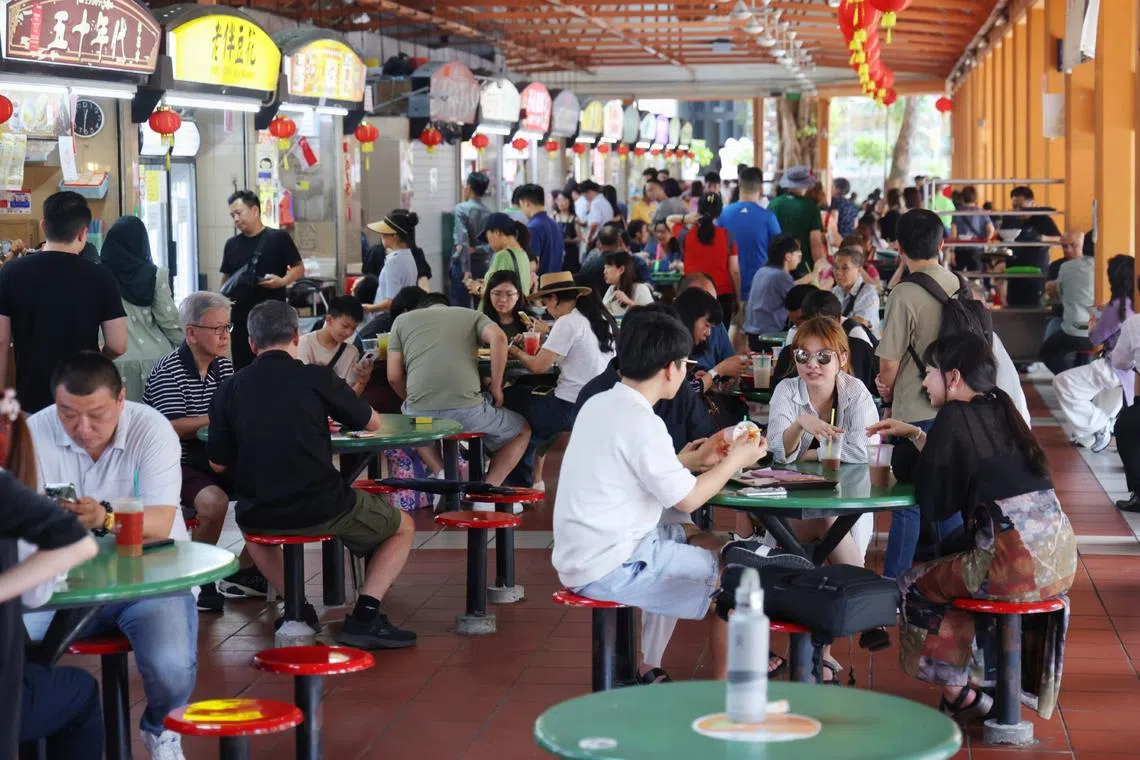GST hike did not ‘turbocharge’ inflation, says PM Wong as he acknowledges cost-of-living concerns
Sign up now: Get ST's newsletters delivered to your inbox

PM Lawrence Wong said Singapore’s central bank assessed the GST increase to have a “transitory” impact on inflation.
ST PHOTO: JASON QUAH
SINGAPORE - The GST increase did not lead to a “turbocharging” of inflation, said Prime Minister Lawrence Wong, noting that price increases moderated after the tax rate was raised in 2023 and 2024.
PM Wong was responding to Leader of the Opposition Pritam Singh, who questioned during the Budget debate
Inflation was driven primarily by global factors – war, supply chain disruptions and rising energy costs – and has since eased globally and in Singapore, he said on Feb 28.
PM Wong, who is also the Finance Minister, added that Singapore’s central bank assessed the GST increase to have a “transitory” impact on inflation. The tax rate was raised from 7 per cent to 9 per cent in two stages,
Inflation peaked in 2022 at 6.1 per cent,
“Where is the turbocharging?” he said. “Look, I know elections are approaching, but this Chamber is not an election rally. Let’s not get carried away by hyperbole and have a debate based on facts.”
The fact is that inflation has eased both globally and in Singapore, said PM Wong in his speech to round up the three-day debate on Budget 2025,
He acknowledged that people are still concerned about cost pressures, and that it takes time to adjust to new price realities.
This concern is not unique to Singapore, as it is felt across many other advanced economies where the headline economic indicators are positive but sentiments poor, added PM Wong.
“We understand these concerns, and that’s why we are continuing to provide temporary help measures,” he said. These include more CDC vouchers and the voucher component in the SG60 package.
“We will continue to provide cost-of-living support for as long as needed, and within our means,” he added.
Addressing points raised by Workers’ Party and Progress Singapore Party (PSP) MPs, PM Wong said they “appear to be unhappy and displeased” that the Government is providing vouchers to help Singaporeans with cost of living.
“They suggest that the Government is relying solely on vouchers to help with the cost of living, but we’ve never said that. These are temporary help measures. They are not long-term solutions,” he said.
The cost-of-living measures and SG60 package
“As we have repeatedly emphasised, the more durable, the most sustainable way to tackle cost of living is to ensure that Singaporeans enjoy higher real incomes, and that must be supported by a strong economy and productivity gains. That remains the key thrust of our approach,” said PM Wong.
While Singapore has done relatively well, he acknowledged that the day-to-day lived realities for Singaporeans may be different.
This is why the Government has taken steps to strengthen the social support system as part of the Forward Singapore engagement exercise,
Rising social spending
PM Wong also responded to calls for the Government to make bolder moves on social policies, including PSP Non-Constituency MP Hazel Poa’s point on the need to put more emphasis on social rather than economic considerations.
He said the Government is prepared to spend more where necessary.
“But it’s equally if not more important to get the policies right and to ensure the overall system is fiscally sound and sustainable,” he said.
PM Wong noted that spending on social development is already more than what is spent on the economy and security combined – and is expected to continue growing in the coming years.
“Ultimately, a strong social support system should not be reliant on the Government alone, even though the Government is going to do more, but it cannot be reliant on the Government alone. We will do more, but our actions must also be complemented by individual and community responsibility.”
The Government has taken steps to progressively strengthen the key pillars of Singapore’s social system and social compact, he added.
These include universal access to primary school, the Central Provident Fund (CPF) scheme for retirement, government subsidies for healthcare and the HDB system for housing.
“And we have progressively enhanced these pillars,” said PM Wong, pointing to schemes that target specific groups such as Workfare for lower-wage workers, Silver Support for vulnerable seniors, and the broader SkillsFuture scheme for all workers.
Adjustments have been made over the years to continue providing assurance to Singaporeans, he noted.
For example, the CPF system – which turns 70 in 2025, at a time when many pension systems in other countries are struggling with sustainability – allows Singaporeans to save for their own retirement with support from their employers.
Saving for retirement is not left to individuals alone, as families are encouraged to help their loved ones save more, while the Government provides risk-free interest rates with extra interest for lower balances.
The Government will continue to review, fine-tune and improve the CPF system to better meet the needs of seniors and to prepare for a future with increased longevity and life expectancy, said PM Wong.
Other areas of social support the Government is looking into include for those with disabilities, caregivers as well as leave arrangements for families.
“We keep an open mind, and we study all your suggestions carefully and beyond ideas shared in this house, we continue to engage widely and hear views from all Singaporeans,” said PM Wong.
“We may not be able to implement every idea. There will be differences of views, and if we can’t implement it for whatever reason, we will explain why,” he said.



